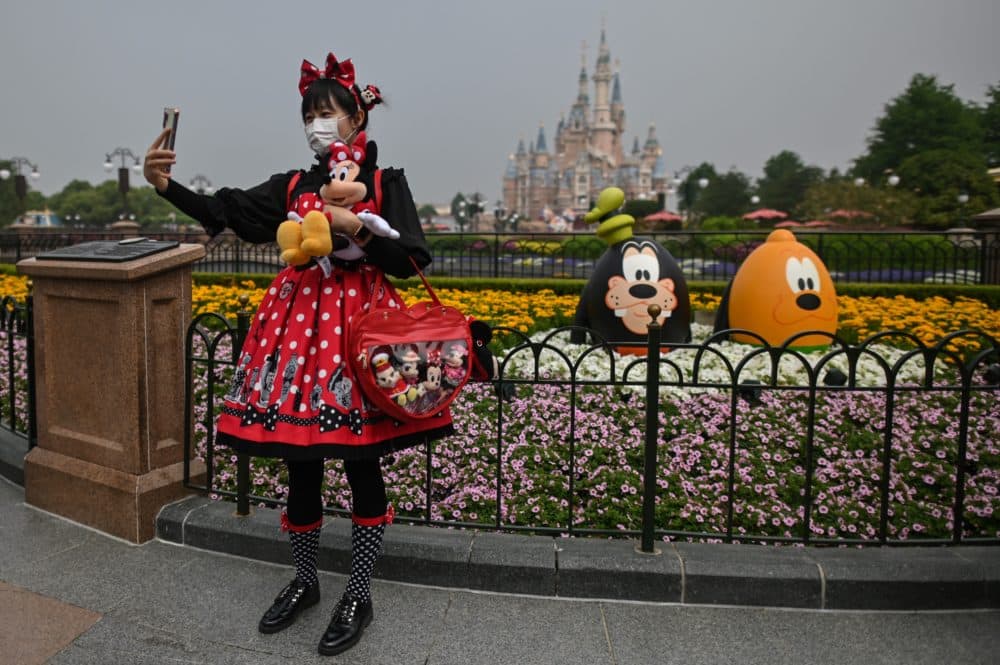Advertisement
Doubts Loom Large For Theme Parks Hoping To Reopen

Disney reopened its shopping, dining and entertainment complex Disney Springs in Florida on Wednesday, the first step in returning the parks to full operation after they shut down in March due to the coronavirus.
The entertainment giant has put in place multiple safety measures for the reopening, including temperature screenings, limiting the number of people who can enter the complex, providing hand sanitizing stations and requiring face masks for any entrants over 3 years old.
Still, Disney released a statement saying shoppers should enter at their own risk; the company says it will not be held liable should a person contract COVID-19 after visiting its facilities.
“An inherent risk of exposure to COVID-19 exists in any public place where people are present. COVID-19 is an extremely contagious disease that can lead to severe illness and death,” the statement on its website reads. “By visiting Disney Springs you voluntarily assume all risks related to exposure to COVID-19.”
The warning is out of character for the company that promises a magical experience for visitors of any age, but business management professor and theme park enthusiast Martin Lewison says Disney is just trying to be transparent about the risks of visiting the park during the pandemic.
“Disney theme parks are designed in such a way that you put the outside world aside and enter a new realm of magic and fantasy,” says Lewison, who’s better known as “Professor Roller Coaster.” “That’s a little bit of a slap in the face to the person that's trying to fantasize when they come and it says, 'Oh, by the way, you may catch a life-threatening illness.’ But on the other hand, I think guests will be taking some sort of risk that wasn't there in the past.”
Similar fears about liability and safe reopenings are circling among the wider theme park and entertainment industry, Lewison says.
While an industry monolith like Disney is better positioned to deal with the crisis, smaller, independently-owned parks could take major economic hits if it’s not safe to open by summer, their peak season, he says.
Advertisement
Interview Highlights
On Disney’s reopening and its accompanying warning
“There is a certain degree of risk that's taken upon by visitors. Disney is really being as transparent as they can be, saying that we're taking whatever reasonable precautions we can to make it a safe place to go. But ultimately, we can't be held responsible. Now, whether they can or cannot be held liable ultimately would end up in the courts if somebody were to actually sue.
“Anybody can stumble when they're getting off a theme park ride and break their leg. And those kinds of risks always exist, and we sort of assume those risks without thinking. But Disney wants to remind you that now there's a new risk. And it does kind of take the sheen off the fantasy. But I hope it has the effect of making guests be that much more careful, that guests should be careful about wearing a mask, that guests should be careful about keeping distance, you know, from other parties in the park. And if that communal behavior leads to fewer infections overall, then I think the warning serves a purpose, other than legal protection.
“I do think that parks like Disney, when they open, I think they'll do it right. And they're going to operate at much lower than normal capacity. And typically at a theme park, you're outdoors. So it's not like being caught inside in a small space with other people. So there are certainly some risks, but I think Disney and the other large companies are going to try to manage the risks as well as they can.”
On the economic future of the larger theme park industry
“Disney has the deepest pockets. But I also think that companies like basically the big seven — Disney, Universal, Six Flags, Cedar Fair, SeaWorld Entertainment — and then there are a couple of foreign-owned chains, Parques Reunidos and Merlin Entertainments — they operate the Legolands — I think those companies are going to get through it. I think this is clearly going to be a difficult period for all of them. I'm more worried about the smaller parks, the regional parks, the mom and pop-owned parks that have been in a single family for generations. There are like 5,000 different amusement and attractions companies in the United States. If you take every amusement park, water park and family entertainment center, there's more than 5,000 of them. So there are definitely some that are going to be under pressure. Hopefully, much of the industry will survive. But of course, it's not just that theme park industry. Anything related to entertainment, travel, tourism is under pressure right now.”
On when he’ll return to theme parks
“The truth is that it's really my wife, I think, that's putting the brakes on things. I'm not anxious to go out, but we do live right in the middle of Queens and it's been hard hit here. And my wife happens to be an E.R. doctor, so my wife has seen COVID-19 way up close. She's definitely spooked about going out in public. And there are definitely some risks to going back to large gatherings of people at this stage of the game. So, I'm certainly excited about the season possibly reopening, but I think that, as I said, my wife is a little bit more on the cautious side. And, you know, she's my riding buddy. So we're probably not going to be going anywhere anytime soon.”
Ashley Locke produced and edited this interview for broadcast with Peter O'Dowd. Lynsey Jeffery adapted it for the web.
This segment aired on May 20, 2020.

